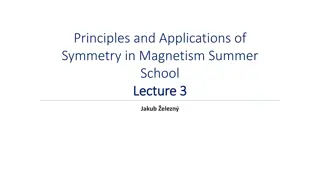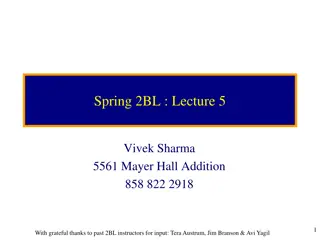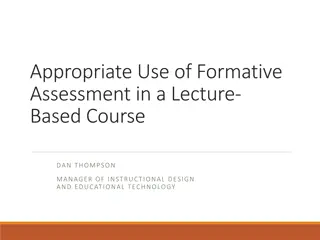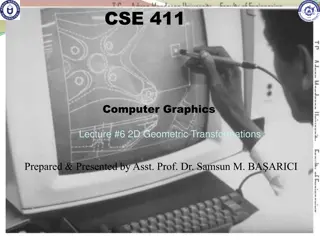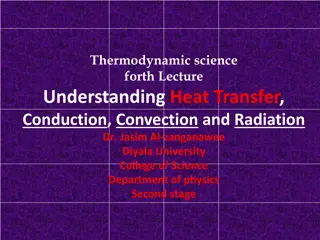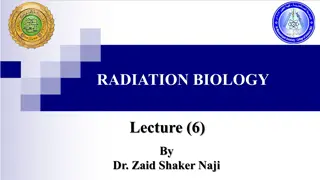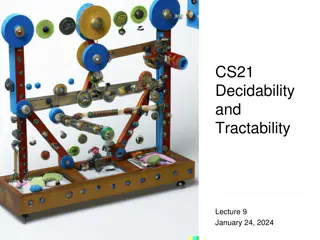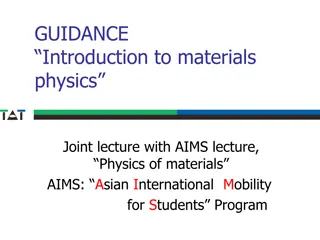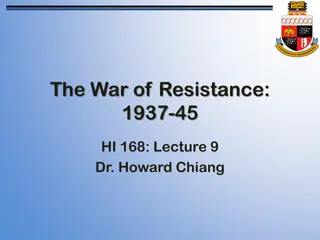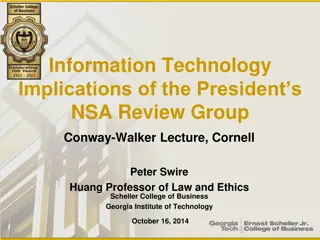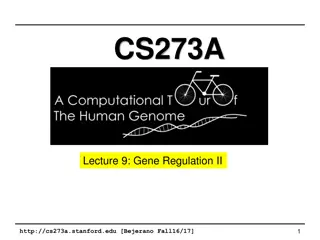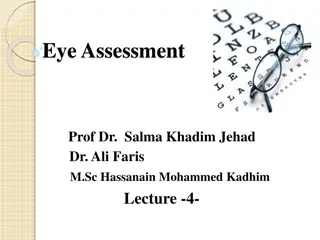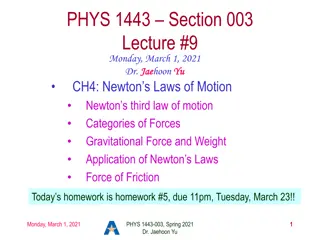
Understanding Operators and Expressions in C Programming
Explore the essential operators in C programming such as arithmetic, relational, logical, assignment, and more. Learn how these operators manipulate data and variables, and how they can be categorized. Dive into integer division, real arithmetic, and relational expressions to understand their functionalities and implications in programming.
Download Presentation

Please find below an Image/Link to download the presentation.
The content on the website is provided AS IS for your information and personal use only. It may not be sold, licensed, or shared on other websites without obtaining consent from the author. If you encounter any issues during the download, it is possible that the publisher has removed the file from their server.
You are allowed to download the files provided on this website for personal or commercial use, subject to the condition that they are used lawfully. All files are the property of their respective owners.
The content on the website is provided AS IS for your information and personal use only. It may not be sold, licensed, or shared on other websites without obtaining consent from the author.
E N D
Presentation Transcript
1 Chapter 3. Chapter 3. Operators, Expressions EEE1002
Introduction 2 C supports a rich set of built-in operators Operators are used to manipulate data and variables C operators can be classified into a number of categories 1. Arithmetic operators 2. Relational operators 3. Logical operators 4. Assignment operators 5. Increment and decrement operators 6. Conditional operators 7. Bitwise operators 8. Special operators EEE1002
Arithmetic Operators 3 Operator Meaning + Addition, unary plus - Subtraction, uninary minus * Multiplication / Division % Modulo division These can operate on any built-in data type allowed in C EEE1002
Arithmetic Operators 4 When both operands in a single arithmetic expression such as a+b , are integers integer arithmetic always yields an integer value Ex) a = 14 , b = 4 a b = 10 a + b = 18 a * b = 56 a / b = 3 a % b = 2 (decimal part truncated) (remainder of division) EEE1002
Arithmetic Operators 5 During integer division, if both the operands are of the same sign, the result is truncated towards zero 6 / 7 = 0 and -6 / -7 = 0 But -6 / 7 = 0 or -1 (Machine dependent) Similarly, during modulo division, the sign of the result is always the sign of the first operand (the dividend) -14 % 3 = -2 -14 % -3 = -2 14 % -3 = 2 EEE1002
Arithmetic Operators 6 EEE1002
Arithmetic Operators 7 Real Arithmetic if x , y and z are floats x = 6.0 / 7.0 = 0.857143 y = 1.0 / 3.0 = 0.333333 z = -2.0 / 3.0 = -0.666667 Mixed-mode Arithmetic one of the operands is real and the other is integer 15 / 10.0 = 1.5 (mixed) 15 / 10 = 1 (unmixed) EEE1002
Relational Operators 8 Operator Meaning < is less than <= is less than or equal to > is greater than >= is greater than or equal to == is equal to != is not equal to EEE1002
Relational Operators 9 ae-1 relational operator ae-2 ae: arithmetic expression Relational expression 1 < 20 4.5 <= 10 a+b != c 6 < 8 3 : False : True : True or False : False Value of relational expression 1 if true 0 if false EEE1002
Relational Operators 10 Arithmetic operators have a higher priority over relational operators If (a + b >= c - 10) If ( (a+b) >= (c-10) ) 15 20 0 (false) EEE1002
Relational Operators 11 Relational expression are used in decision statements such as if and while if (d ! =0 ) x = c/d; else { printf( enter new number\n ); scanf( %d ); } while(n<=10) { } EEE1002
Relational Operators 12 Relational Operator Complements > < == is complement of is complement of is complement of <= >= != Actual one !(x<y) !(x>y) !(x!=y) !(x<=y) !(x<y) !(x==y) Simplified one x >= y x <= y x==y x > y x >= y x!=y EEE1002
Logical Operators 13 C has the following three logical operators && || meaning ! meaning meaning AND OR NOT a && b a-b || c !a op-2 op-1 && op-2 op-1 || op-2 Non-zero 1 0 0 Non-zero 0 0 0 value of the expression op-1 Non-zero Non-zero 0 0 1 1 1 0 EEE1002
Logical Operators 14 Some usage of logical expressions are: 1. if (age > 55 && salary < 1000) 2. if (number < 0 || number > 100) Relative precedence of the relational and logical operators : Highest ! > >= < <= == != && Lowest || EEE1002
Assignment Operators 15 v = v op exp v op = exp variable expression Arithmetic operator Assignment operator x = x +3; x += 3; x= x + y+1; x += y+1; EEE1002
Assignment Operators 16 Shorthand assignment operators Statement with simple shorthand operator Statement with simple assignment operator a = a + 1 a = a 1 a = a*(n+1) a = a/(n+1) a = a % b a+=1 a-=1 a*=n+1 a/=n+1 a%=b EEE1002
Assignment Operators 17 Shorthand assignment operators has three advantages 1. What appears on the left-hand side need not be repeated and therefore it becomes easier to write. 2. The statement is more concise and easier to read. 3. the statement is more efficient. EEE1002
Assignment Operators 18 # include <stdio.h> # include <conio.h> #define N 100 #define A 2 void main() { int a; a = A; while( a < N ) { printf("%d\n", a); a *= a; } Output 2 4 16 } EEE1002
Increment and Decrement Operators 19 ++m; m++; --m; m--; ++m; is equivalent to m = m + 1; (or m += 1;) --m; is equivalent to m = m 1; (or m -= 1;) While ++m and m++ mean the same thing when they form statements independently, they behave differently when they are used in expressions on the right-hand side of an assignment statement EEE1002
Increment and Decrement Operators 20 Prefix operator first adds 1 to the operand and then the result is assigned to the variable on left m = 5; y = ++m; y and m = 6 m=m+1; y=m; Postfix operator first assigns the value to the variable on left and then increments the operand m = 5; y = m++; y = 5 and m = 6 y=m; m=m+1; EEE1002
Increment and Decrement Operators 21 Examples: a[i++] = 10; /* a[i] = 10; i = i+1; */ m = n++ -j + 10; /* m = n j +10; n = n + 1; */ i=3; j=5; a[++i] = b[j++]; /* a[4] = b[5]; */ i = j; /* i = j = 6 */ EEE1002
Increment and Decrement Operators 22 EEE1002
Conditional Operators 23 exp1 ? exp2 : exp3 An operator pair ? : is available in C to construct conditional expressions of the form The operator ?: works as follows : 1. exp1 is evaluated 2. If exp1is true, exp2is evaluated and becomes the value of the expression. 3. If exp1is false, exp3is evaluated and becomes the value of the expression EEE1002
Conditional Operators 24 For example, a = 10; b = 15; x = ( a > b ) ? a : b; This can be achieved using the if..else statements If ( a > b ) x = a; else x = b; EEE1002
Bitwise Operators 25 Operator & | ^ << >> Meaning bitwise AND bitwise OR bitwise exclusive OR shift left shift right bitwise operatorsfor manipulation of data at bit level These operators are used for testing the bits (shifting them right or left) 1001010 & 0101001 = 0001000 Bitwise operators may not be applied to float or double EEE1002
Special Operators 26 C supports some special operators 1. comma , operator 2. sizeof operator 3. pointer operators (& and *) Chpter11 4. member selection operator (. and ) Chapter10,11 EEE1002
Special Operators 27 The Comma Operator The comma operator can be used to link the related expressions together A comma-linked list of expressions are evaluated left to right and the value of right-most expression is the value of the combined expression value = ( x = 10, y = 5, x+y ); value = 15 EEE1002
Special Operators 28 Comma operator has the lowest precedence of all operators, the parentheses are necessary Some applications of comma operator are : In for loops: for ( n = 1, m = 10; n <= m; n++) In while loops: while ( c = getchar (), c != 10 ) Exchanging values: t = x, x = y, y = t; for ( init-expression ; cond-expression ; loop-expression ) EEE1002
Special Operators 29 The sizeof Operator sizeof is a compile time operator and when used with an operand, it returns the number of bytes the operand occupies m=sizeof (sum); n =sizeof (long int); k =sizeof (235L); sizeof operator is normally used to determine the lengths of arrays and structures It is also to allocate memory space dynamically to variables during execution of a program EEE1002
30 # include <stdio.h> void main() { int a, b, c, d; a = 15; b = 10; c = ++a - b; /* a = 16, b = 10, c= 6 */ printf("a = %d b = %d c = %d\n",a, b, c); /* d = 10 + 16 b = 11 */ d = b++ +a; printf("a = %d b = %d d = %d\n",a, b, d); /* a=16 b=11 d= 26 */ printf("a/b = %d\n", a/b); printf("a%%b = %d\n", a%b); printf("a *= b = %d\n", a*=b); printf("%d\n", (c>d) ? 1 : 0); printf("%d\n", (c<d) ? 1 : 0); a%b = 5 0 1 } EEE1002
31 \ - escape the next character " - start or end of string - start or end a character constant % - start a format specification \\ - print a backslash \" - print a double quote \ - print a single quote %% - print a percent sign EEE1002
Arithmetic Expressions 32 An arithmetic expression is a combination of variables, constants, and operators C can handle any complex mathematical expressions EEE1002
Evaluation of Expressions 33 variable = expression; The expression on the RHS is evaluated first the result then replaces the previous value of the variable on the LHS. All variables used in the expression must be assigned values before evaluation is attempted x = a * b c; y = b / c * a; z = a b / c + d; The variables a, b, c, d must be defined before they are used in the expressions EEE1002
Precedence of Arithmetic Operators 34 An arithmetic expression without parentheses will be evaluated from left to rightusing the rules of precedence of operators High priority * / % Low priority + - EEE1002
Evaluation of Expressions 35 void main() { float a, b, c, x, y, z; a = 9; b = 12; c = 3; x = a - b / 3 + c * 2 - 1; y = a - b / (3 + c) * (2 - 1); z = a -(b / (3 + c) * 2) - 1; /* x= a (b/3) + (2c) 1 */ printf("x = %f\n", x); /* 10.000000 */ printf("y = %f\n", y); /* 7.000000 */ printf("z = %f\n", z); /* 4.000000 */ } EEE1002
Precedence of Arithmetic Operators 36 EEE1002
Some Computational Problems 37 Precision of computation is not perfect, due to finite bit size alocated for numbers a = 1.0 / 3.0; b = a * 3.0; No guarantee that b = 1 Division by zero Abnormal termination of program Overflow or Underflow errors int n, a = 0; for ( n = 1; n <= 10000; n++) a = 10*a + 100*n; EEE1002
Some Computational Problems 38 void main() { float sum, n, term ; int count = 1 ; sum = 0 ; printf("Enter value of n\n") ; scanf("%f", &n) ; term = 1.0/n ; while( count <= n ) { sum = sum + term ; count++ ; } printf("Sum = %f\n", sum) ; Enter value of n 99 Sum = 1.000001 Enter value n 143 Sum = 0.999999 } EEE1002
Type Conversions in Expressions 39 Implicit Type Conversion C permits mixing of constants and variables of different types in an expression In this case, the lower type higher type automatically before the operation proceeds EEE1002
Type Conversions in Expressions 40 Implicit Type Conversion EEE1002
Type Conversions in Expressions 41 All short and char are automatically converted to int 1. if one of the operands is long double, the other will be converted to long double and the result will be long double 2. if one of the operands is double, the other will be converted to double and the result will be double 3. if one of the operands is float, the other will be converted to float and the result will be float 4. if one of the operands is unsigned long int, the other will be converted to unsigned long int and the result will be unsigned long int EEE1002
Type Conversions in Expressions 42 5. if one of the operands is long int and the other is unsigned int, (a) if unsigned int can be converted to long int, the unsigned int operand will be converted as such and the result will be long int (b) both operands will be converted to unsigned long int and the result will be unsigned long int 6. if one of the operands is long int, the other will be converted to long int and the result will be long int 7. else, if one of the operands is unsigned int, the other will be converted to unsigned int and the result will be unsigned int EEE1002
Type Conversions in Expressions 43 EEE1002
Type Conversions in Expressions 44 The final result of an expression is converted to the type of the variable on the left of the assignment statement before assigning the value to it n = 10.1 / 7 ; n = 1 1. float to int causes truncation of the fractional part 2. double to float causes rounding of digits 3. long int to int causes dropping of the excess higher order bits EEE1002
Type Conversions in Expressions 45 Explicit Conversion (type-name) expression int float ratio; female_number, male_number; ratio = female_number / male_number; ratio = 30 / 60; ratio = 0 ??? ratio = 0.5 EEE1002
Type Conversions in Expressions 46 ratio = (float) female_number / male_number; The operator (float) affect the value of the variable female number The type of female number remains as int in the other parts of the program EEE1002
Operator Precedence and Associativity 47 if (x == 10 + 15 && y < 10) The operators at the higher level of precedence are evaluated first The operators of the same precedence are evaluated either from left to right or from right to left , depending on the level if (x == 25 && y < 10) y < 10x is TRUE (1) x==25 is FALSE (0) If (FALSE && TRUE) EEE1002
Operator Precedence and Associativity 48 Summary of C operators EEE1002
Operator Precedence and Associativity 49 EEE1002
Mathematical Functions 50 C compilers support basic math functions : < math.h > EEE1002


